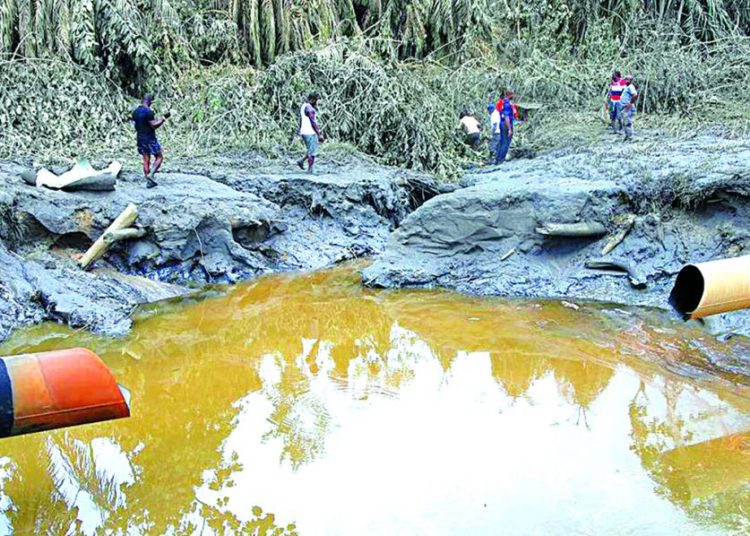The issue of illegal lifting of Nigeria’s crude oil, commonly referred to as oil theft, is a disturbing phenomenon even if it is not exactly a recent development. It has been going on with the domination of the industry by the eight oil majors, all of them multi-nationals, in cahoots with their local agents.
Those oil majors who controlled activities in the sector frustrated every effort to get them to install metering devices at the pump heads that would have made it possible for there to be adequate and accurate record of the volume drilled and exported.
But the matter became an economic crisis with the penetration of militants in the Niger Delta into the racket and the deployment of security personnel to, ostensibly, check the economic drain the practice has become. For instance, between 2009 and 2019, the Nigeria Extractive Industry Transparency Initiative (NEITI) reported that the country lost $41.9 billion to crude oil thieves.
Similarly, the country was reported to have lost about $3 billion to crude oil thieves in 2021 which translates to N1.4 trillion. With rising crude oil prices, the figure is estimated to rise to about $6 billion dollars (about N3 trillion).
The Chief Executive Officer of Nigerian Upstream Petroleum Regulatory Commission (NUPRC), Gbenga Komolafe, told the Lagos Chamber of Commerce and Industry (LCCI) at a Public-Private dialogue on crude oil theft and artisanal modular refineries, in Lagos recently that Nigeria lost at least $1 billion in the first quarter of 2022 due to oil theft. According to him, an unusual level of theft estimated at a daily average of 103,000 barrels which was recorded in 2021 had grown to 120,000 barrels in the first quarter of 2022. As if to assuage the rising angst of his audience, he said that his agency has developed key initiatives aimed at reducing crude oil theft and illegal artisanal refining.
Tackling The Oil Thieves And Economic Saboteurs
His position was further reinforced by the Group Chief Executive Officer of the Nigerian National Petroleum Company Limited (NNPCL), Mele Kyari, who told a parliamentary committee that officials in Nigeria discovered an illegal connection line from one of its major oil export terminals into the sea that had been operating undetected for nine years. NNPC Ltd also said that the theft point extended from the Trans- Escravos pipeline and that the Afremo platform, operated by the Shell Petroleum Development Company of Nigeria (SPDC), was the suspected exit point of the stolen crude. In his words, the 4-kilometre (2.5-mile) connection from the Forcados export terminal, which typically exports around 250,000 barrels per day (bpd) of oil, into the sea was found during a clamp-down on theft.
It is in the face of these disclosures that we are worried with the claim of Kyari that the scale of oil theft is significantly reducing. If that was meant to pacify Nigerians who have been consistently denied the benefit of the resource, then it was misdirected. This newspaper holds this position because with the mobilisation of security agencies in the area, Nigerians would have loved to hear that the criminality has stopped. His position is even milder than the out right denial of the Nigerian Navy that there was oil theft.
With these humongous sums lost to thieves, we are compelled to highlight the country’s debt profile which according to Debt Management Office (DMO) is rising at an exponential rate. As of December, 2021, Nigeria’s public debt profile is said to have hit N38 trillion.
It was also reported that as of 31 March, 2021, Nigeria’s external debt stock was about US$32.9 billion. Inside this total figure, debt to multilateral institutions such as the World Bank accounted for 54.3 per cent, commercial debt accounted for 33 per cent, bilateral debt 12.7 per cent and promissory notes 0.5 per cent. Latest data from the Debt Management Office reveals that Nigeria is owing China, alone, about $4.1 billion as of September 2021. While this roguery is ongoing, the country is not able to meet its OPEC quota. Even worse, Nigeria is not benefiting as it should from the high price of crude in the international market.
In our considered opinion, if the money lost to oil thieves were saved and paid into the national coffers, the borrowing spree in government circles would not have been as pronounced as it is presently. This is why we urge the government to tie up the loose ends and bring to a decisive halt this drain on national resources.
There are allegations that the security agencies have become part of the problem they were deployed to solve. It is on record that security operatives lobby to be posted to the oil rich Niger Delta. We consider it an admission of failure on the part of the security agencies that a non-state operative was recently awarded the contract to protect the oil pipelines.
Be that as it may, Nigerians desire to see an improvement in the management of the upstream and downstream sectors of the oil industry. We also make bold to say that the artisanal thieves who are the focus of the security operatives are not the problem. They are mere hustlers trying to eke out a living. The real game is the high-net-worth individuals who can afford to buy ships and have connections in the international oil market. They must be stopped, exposed and disgraced.





